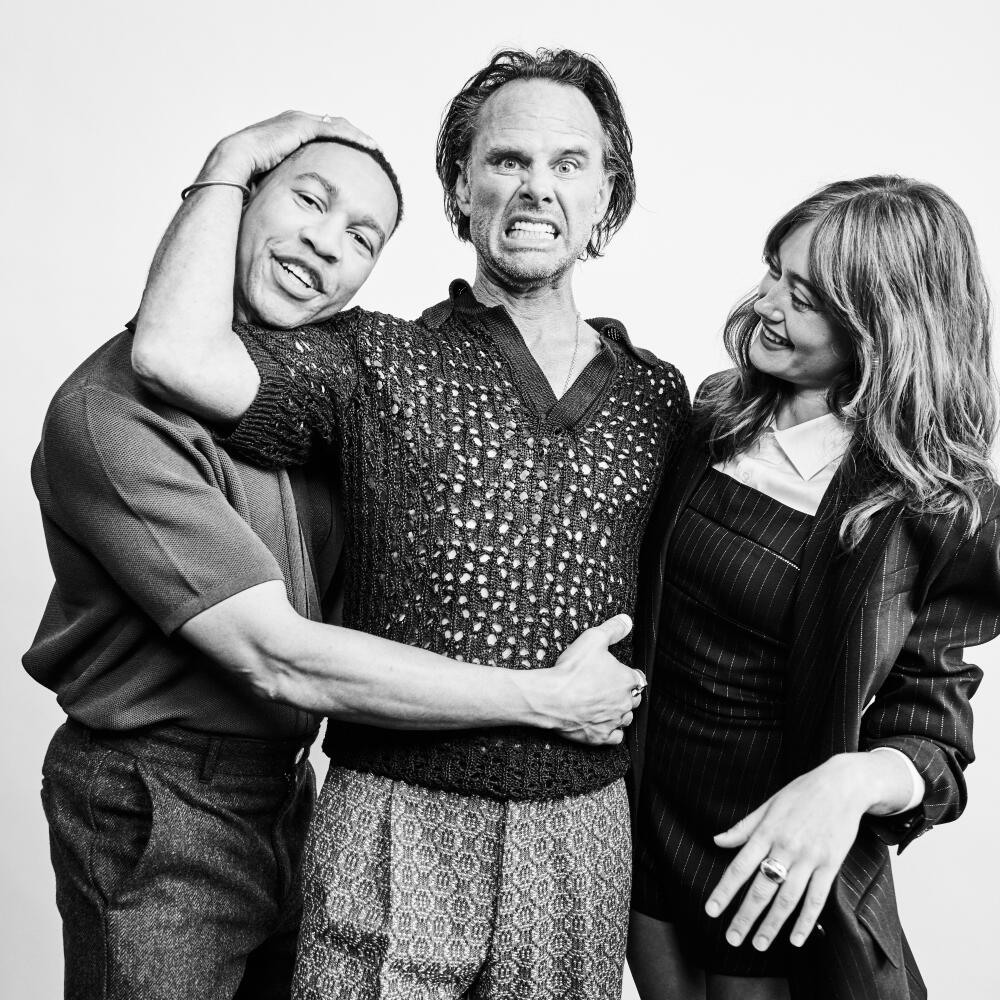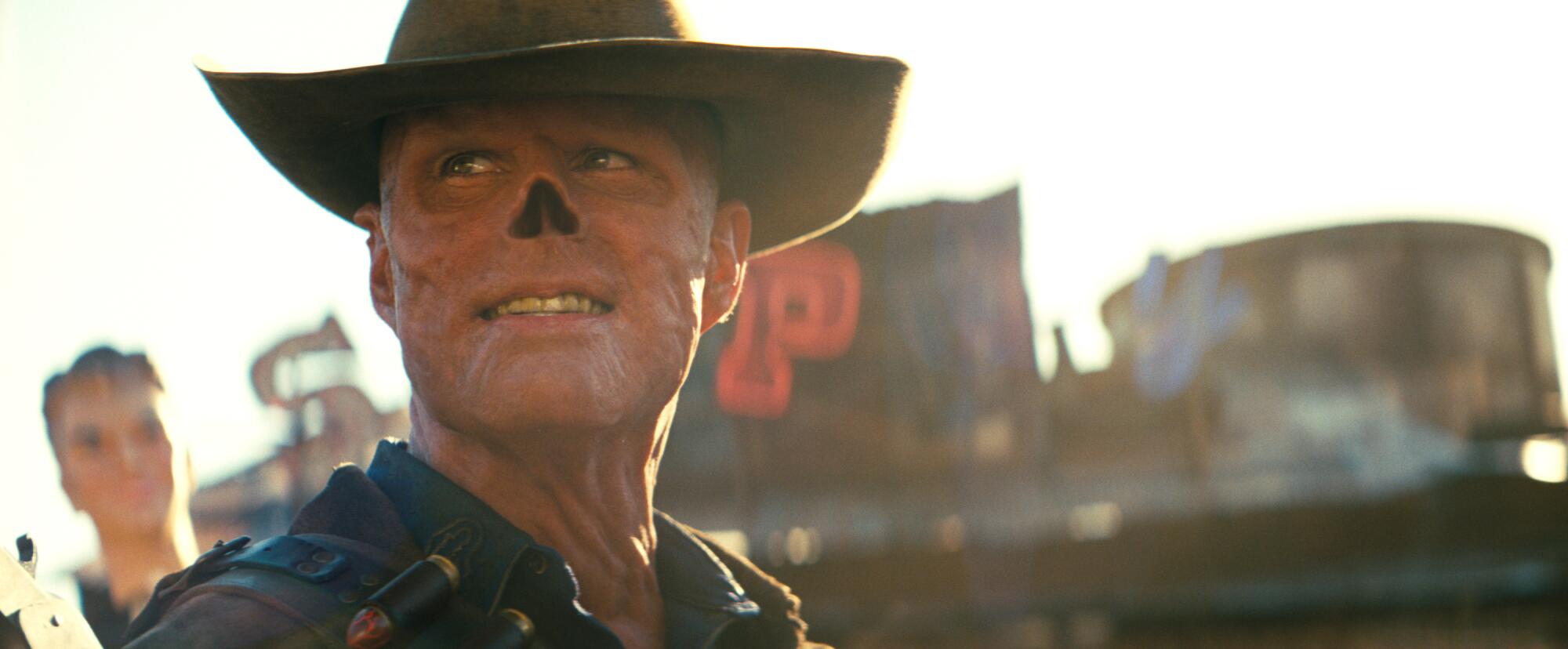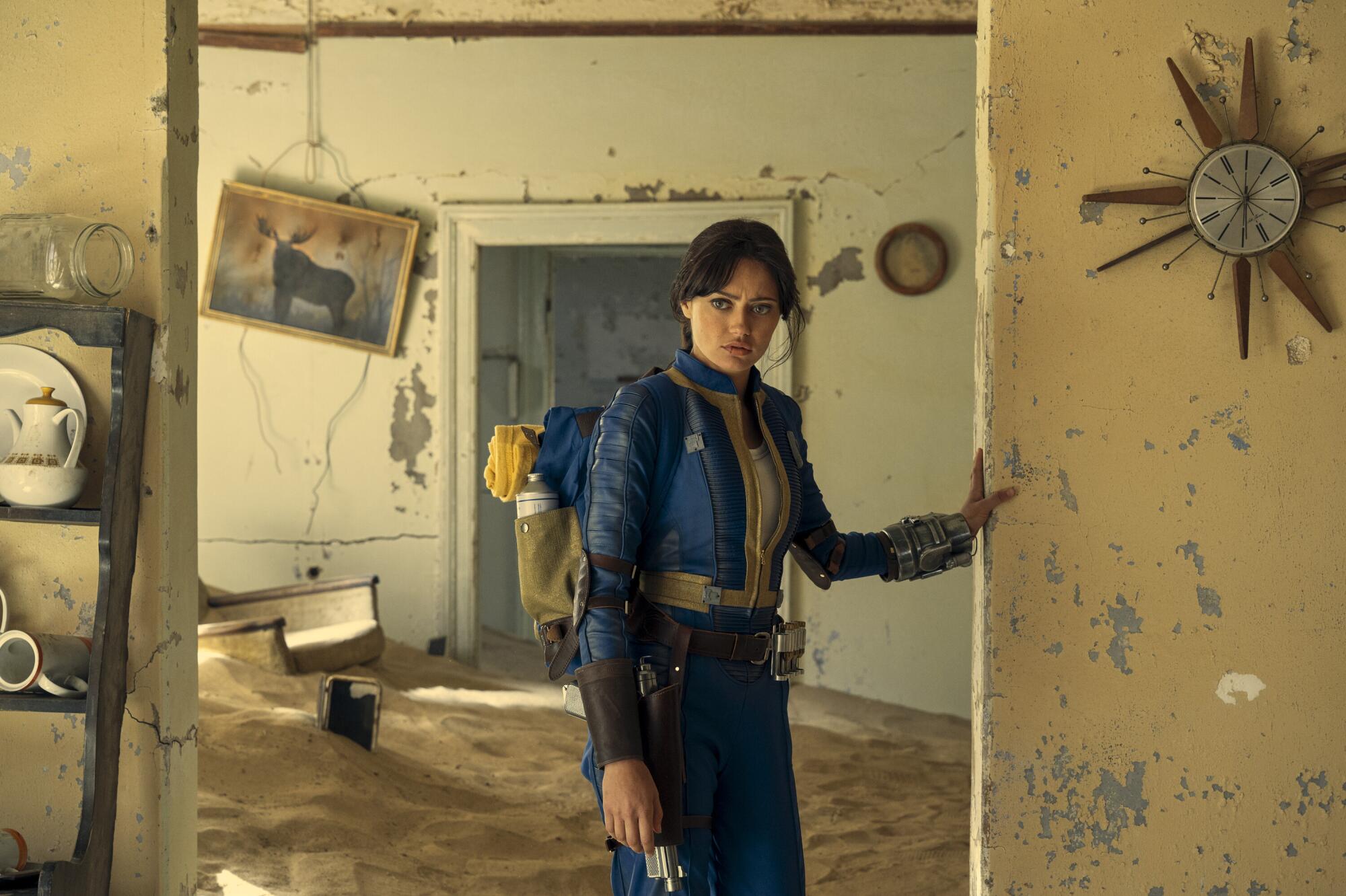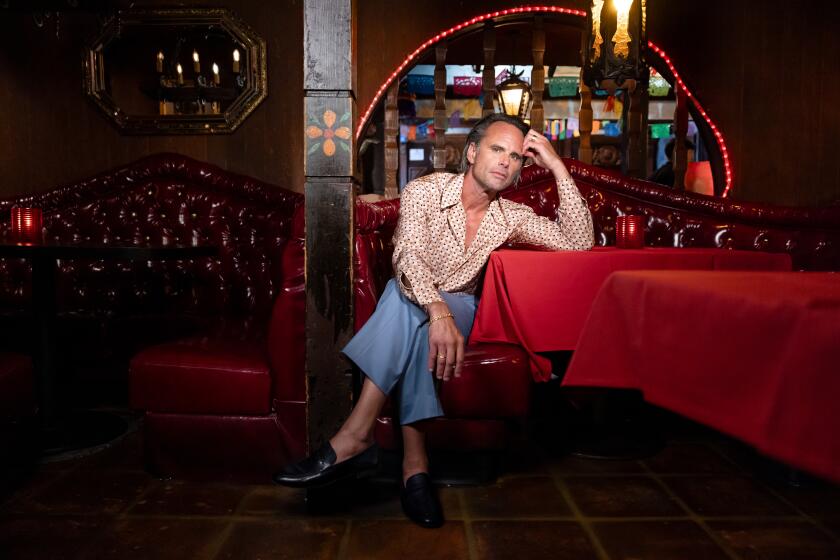
If you thought “Fallout,” this year’s smash TV video game adaptation, would just capitalize on the success of 2023’s “The Last of Us,” you’re in for a fun, funny, socially conscious surprise.
The Prime Video series, overseen by HBO’s “Westworld” co-creator and “The Dark Knight” screenwriter Jonathan Nolan, launches from Bethesda Softworks’ role-playing franchise concept of a future yet 1950s retro society destroyed in minutes by a nuclear war. The surface is still a wasteland 219 years later, but the descendants of wealthy survivors have flourished in isolated, luxury bunkers built by the Vault-Tec Corp.
In the show’s opener, chipper, capable but otherwise unprepared Lucy (“Yellowjackets’” Ella Purnell) leaves her vault to rescue her kidnapped father. In the sandblasted remains of Los Angeles, she encounters the grotesque, eat-or-be-eaten reality of the remaining have-nots. Key among her new companions are Maximus (Aaron Moten, “Emancipation”), a squire in the militaristic Brotherhood of Steel who’s illegally appropriated a knight’s power armor suit; and the Ghoul (Emmy-nominated “Justified” actor Walton Goggins), a wicked, decaying bounty hunter kept alive by drugs for centuries, whom we see in prewar flashbacks as the good-guy cowboy actor Cooper Howard.
The veteran character actor from ‘The Shield’ and ‘Justified’ is having a standout year, playing the Ghoul in Prime Video’s ‘Fallout’ and a role in Season 3 of ‘The White Lotus.’
With their Southern manners intact, Austin-born, Juilliard-trained Moten flew in to L.A. from his home in Iceland and Georgia-bred Goggins arrived from the Thailand set of “The White Lotus” Season 3 to join London-born Purnell to talk to The Envelope. None of them played “Fallout” games before the show, and only Purnell has done so since. Badly, she says.
How was filming part of postapocalyptic L.A. in an African desert?
Ella Purnell: Namibia was beautiful, the scenery is incredible. But we were really up against the elements. In New York, it was incredibly hot and then incredibly cold. In Namibia, sandstorms! The scene where I come out of the vault and am talking to the farmer, there was this crazy sandstorm and so much sand was getting in my eyes that I was crying all the way through. Jonah was like, “This isn’t an emotional scene, you can pull back.”

What was the Ghoul makeup ordeal like?
Walton Goggins: Five hours in the chair was challenging out of the gate, but then it becomes the new normal. There is a meditation and a concentration involved with beginning every day spending that amount of time in the chair and going into that headspace. But when I say it was hot, it was extremely hot. I didn’t anticipate how fatigued I would be. I’m not one to complain, but the very first day, sitting on a log by myself, I thought, “Man, I don’t think you can do this. You’re not that young anymore.”
How about you, Aaron? There were practical versions of Maximus’ power armor that you wore, correct?
Aaron Moten: There were several aspects of the suit. One we called the “clamshell” that can’t move, but the back of it opens up so you can step into it. Then there is the top half; it’s about 50 pounds. You feel like a weird metal gorilla walking around in that thing. The motorized helmet is part of the weight that gets added to it, there’s a battery element. Any time you see the full suit in motion, it’s Adam Shippey, whom I call our stunt extremist. That suit is 100 pounds-plus. In between takes, we’d find ways to prop each other up because again, when you’re not a complainer, you are suffering a lot, barely able to breathe because of the weight.
And toughest for you, Lucy’s jumpsuit, Ella?
Purnell: I am a complainer! You know how hard it was to pee in that thing? No, just kidding. I had a jolly of a time compared to these guys.
Moten: Yeah, dunked in water ...
Goggins: She went through a lot.

Purnell: I did a lot of fight training and all, but I think I speak for all of us when I say it was f— fun! For all of the challenges, for all of the insane torture scenes, the weather ... it was so fun. And I did so many gross things on this show! I mean, biting off the Ghoul’s finger and spitting it out; let me tell you why that was gross. We only had one finger and we were trying to get that shot before the sun went down over a building. We filmed fast, no rehearsal; me and Walt and trust and communicating. I was probably biting your actual finger a little too hard — I’m still sorry for that — then they’d put the fake finger in my mouth and I’d spit it on the ground and stomp on it. Then you’d pick it up, dunk it in some water and put it back in my mouth. We’d do that over and over again. By the end you’ve got sand, you’ve got sticky blood, my harness is still on, and your finger’s probably bleeding from me biting it.
One thing “Fallout” has that most dystopian shows don’t is a sense of humor.
Goggins: That’s built into the DNA of the property itself. “Fallout,” the game, has this subversive, satirical humor. There’s an audience that had to be expecting a version of that.
Purnell: I like the tone of the show. I don’t love watching postapocalyptic stuff because it’s depressing and it stays with me for months. I work very hard to maintain a positive outlook, and I try not to indulge myself in catastrophic thinking. But I will say that humans always find a way to survive, and one way we survive is by using humor as a coping mechanism. That’s what I love about the show when it comes to social commentary: No matter what happens in the next hundreds of years, we’ll always be funny.
Anything else about the show’s metaphorical commentary?
Moten: This Eisenhower-y on steroids, prewar future world is removed enough from our reality, with parallels, so that we can see ourselves outside of it but also in it. By watching that world go through what they go through is, for us, to send ourselves there so that we don’t [actually] do it.
Goggins: This isn’t the first time this has been done. In the last decade, it’s been done maybe more than ever before in the history of this medium, [the theme of] naivete, and morality is a morality of convenience. We live in a bubble. There is that experience for the 0.5% or the 1% or the 10%, however you break that down, and then there’s the reality that everyone else lives with. If you can take this topic, this reality of the world for so many people on both sides of it, and make it palatable, then you’re doing a service to the community that watches your show.
All of your characters go through eye-opening journeys and major moral evolutions. How did each of you approach their development?
Moten: The most challenging aspect of Maximus is that he really is a heroic person that we see glimpses of, but he’s at war within himself. He’s just as brave as he is terrified of this world in which he exists. I felt like this was an opportunity to show a side of masculinity that doesn’t get portrayed often on film. And I kept thinking of something Shakespeare wrote: In “Julius Caesar” Cassius’ ambition is described as being like a hungry dog. That was an image we really drew from in the creation of Maximus. He’s hungry for something that he doesn’t have, and even when that ambition changes directions, he’s almost desperate in his need for it.
Purnell: It was reiterated to me time and again that Lucy is our introduction to this world, and there’s a lot of pressure being the good guy. OK, she’s good, she’s morally righteous, but how do you play that and play this relentless optimism? Y’know, she’s incredibly privileged and quite not self-aware, especially at the beginning of the show. That can definitely come across as annoying and it can lose people quickly. Somewhere in the back of my mind was I could be too unaware, too privileged, hitting my “okey dokeys” a little too hard. You have to break that character down just to let her build herself up as herself and not a product of Vault-Tec. Which is why her relationship with the Ghoul is so crucial.
Prime Video’s hit show “Fallout” and other pop culture depictions of the postapocalypse are pretty far from reality, as this writer learns from Annie Jacobsen’s “Nuclear War: A Scenario.”
And I guess the key question for you is, how much, if any, of innocent, decent Cooper Howard still exists in the cynical, cruel Ghoul?
Goggins: The biggest challenge was how to get these two people to speak to each other over time. Not just make a decision about that from an esoteric point of view, but practically the same person at very different points in his life. How are they similar and how are they different? You have to understand Cooper Howard in order to understand the Ghoul. You have to see everything that he had to understand everything that he’s lost.
I also truly believe that his journey isn’t solitary. It is meant to be, in some ways, a metaphor for what the world lost. It is through Cooper Howard’s eyes that you see what life was like before the bombs were dropped. It’s not just his experience, but it’s the world that was fallen.
More to Read
From the Oscars to the Emmys.
Get the Envelope newsletter for exclusive awards season coverage, behind-the-scenes stories from the Envelope podcast and columnist Glenn Whipp’s must-read analysis.
You may occasionally receive promotional content from the Los Angeles Times.












